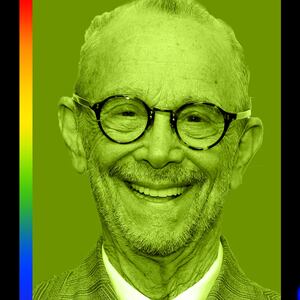In this special series, LGBT celebrities and public figures talk to Tim Teeman about the Stonewall Riots and their legacy—see more here.
Anthony Rapp
Actor (Rent, Star Trek: Discovery)
How and when did you first hear about the Stonewall Riots, and what did you make of them?
My earliest memory is around the time of doing Six Degrees of Separation in the early 1990s when I was 18 and newly moved to New York from Joliet, Illinois. I was doing that show with John Cameron Mitchell. I was talking to him, I had my first boyfriend. I started watching gay movies like Longtime Companion. I was very aware of HIV and AIDS. I had been in plays since I was 10, and seen people get sick and die.
I met Larry Kramer when I did a reading of The Destiny of Me (the sequel to The Normal Heart). Spending time with him was so galvanizing, to be around somebody who had been part of various revolutions. I heard about the riots, and how they happened the night of Judy Garland’s funeral. My ex-boyfriend had a small part in the Stonewall movie made in the 1990s. As a landmark, the bar resonated with me powerfully.
What is their significance for you now?
It was the beginning of the notion of visibility, loudly and publicly declaring we have to do something about the fact that we were marginalized. Our rights had been taken away, we were hunted in some cases by police. There were bar raids, arrests. The riots said we were no longer going to put up with oppression and physical violence.
How far have LGBT people come in the last 50 years?
The Trump administration is doing what it is doing in direct response to progress. This is the last gasp of people to put things back the way they were. They can try to shove it down, but the genie is so far out of the bottle it’s never going back in.
The fact more younger people can now talk about gender fluidity with their families, and the amount of support Wilson (Cruz, his Star Trek: Discovery co-star) and I get as a couple on the show from people from all walks of life are indicators of progress.
One part of the strongest desire to come out publicly was to encourage young people and to demonstrate that coming out was not a detriment. I’m happy to see more and more young people completely adored and embraced by their families. I’m sure it’s harder for people in certain pockets of the country, but even in those pockets there are oases of support and there is still the internet.
What would you like to see, LGBT-wise, in the next 50 years?
Legal hurdles to fall. Barriers to adoption and parental rights to fall. That has to get resolved. Hopefully we can put pressure on countries with anti-LGBT laws, and make progress all over the world, not just our country.
In this country there is still resistance from the most extreme right, but they have less and less traction. I’m sort of an idealistic person. I believe in Tony Kushner’s line that the world only spins forward. I’m not saying there won’t be more damage, but it won’t be permanent. Lin Manuel Miranda’s idea, “Love is love is love,” seems to have penetrated a large number of people.
It’s been gratifying and an honor to have been part of that with Rent. There was also Angels in America, Pedro (Zamora) in The Real World, the example of Ellen (DeGeneres). And now RuPaul’s Drag Race and Pose.
The fact we’re having a robust discussion about trans representation is amazing. Yes, there is blowback, but blowback is always a corollary with progress. As with the black civil rights movement, there is so much unresolved, terrible bullshit in the underbelly. But the progress is still enormous.
What would you say to the Stonewall demonstrators if you could?
“Thank you. You have no idea what you began. You changed the world, thank you.”


